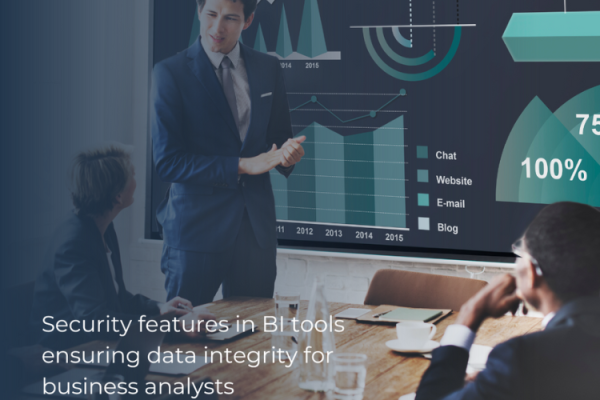
In BI tools, security is paramount to maintain data integrity and protect sensitive information. Here’s an overview of security features to ensure data integrity for business analysts
Maintaining data integrity is crucial for any business intelligence (BI) initiative to ensure accurate analysis and decision-making. Several BI tools offer features and capabilities to help maintain data integrity:
- Tableau: Tableau provides data preparation tools that allow users to clean, transform, and blend data from multiple sources while ensuring data integrity through built-in validation and verification mechanisms.
- Microsoft Power BI: Power BI offers data modeling capabilities that enable users to define relationships between data sources and create data integrity rules to enforce consistency an d accuracy.
- IBM Cognos Analytics: Similarly IBM Cognos provides data governance features that allow organizations to define data quality standards, monitor data quality metrics, and enforce data integrity rules across the BI environment.
- Qlik Sense: Qlik Sense includes data profiling and data lineage capabilities that help users understand the quality and lineage of their data, ensuring data integrity throughout the BI lifecycle.
- SAP BusinessObjects: SAP Business Objects. It offers data quality management tools that enable users to profile, cleanse, and standardize data to ensure consistency and accuracy for BI reporting and analysis.
Integrity and Strategy Example
Role-based processing: BI tools can assign specific roles and access to users. It is ensuring that only authorized data and processes are accessed.
Multi-factor authentication (MFA): Adds a layer of security by requiring multiple levels of authentication for the user context.
Data Encryption and Masking
Data encryption: BI devices encrypt data at rest and in transit, protecting it from unauthorized access during storage and transmission.
Masking of Sensitive Data: Enables sensitive information to be obscured or obscured.
It is to ensure that only authorized personnel can see the entire data set accordingly
BI Tools Audit procedures and logging:
Audit logs: BI tools maintain detailed records of user activity, providing detailed records.
It is of who accessed what and when, and helping with monitoring and compliance accordingly
Activity monitoring: Similarly real-time monitoring of user behavior helps identify abnormalities or unauthorized. It provides immediate action accordingly
BI Tools in Data governance and compliance:
Compliance standards: It complies with industry standards (such as GDPR, and HIPAA) .
It offers features that facilitate compliance, ensuring data privacy and integrity accordingly
Data Retention Policies: It allows data retention policies to be defined and enforced accordingly It is to ensure that data is stored when required and safely deleted when no longer accordingly
